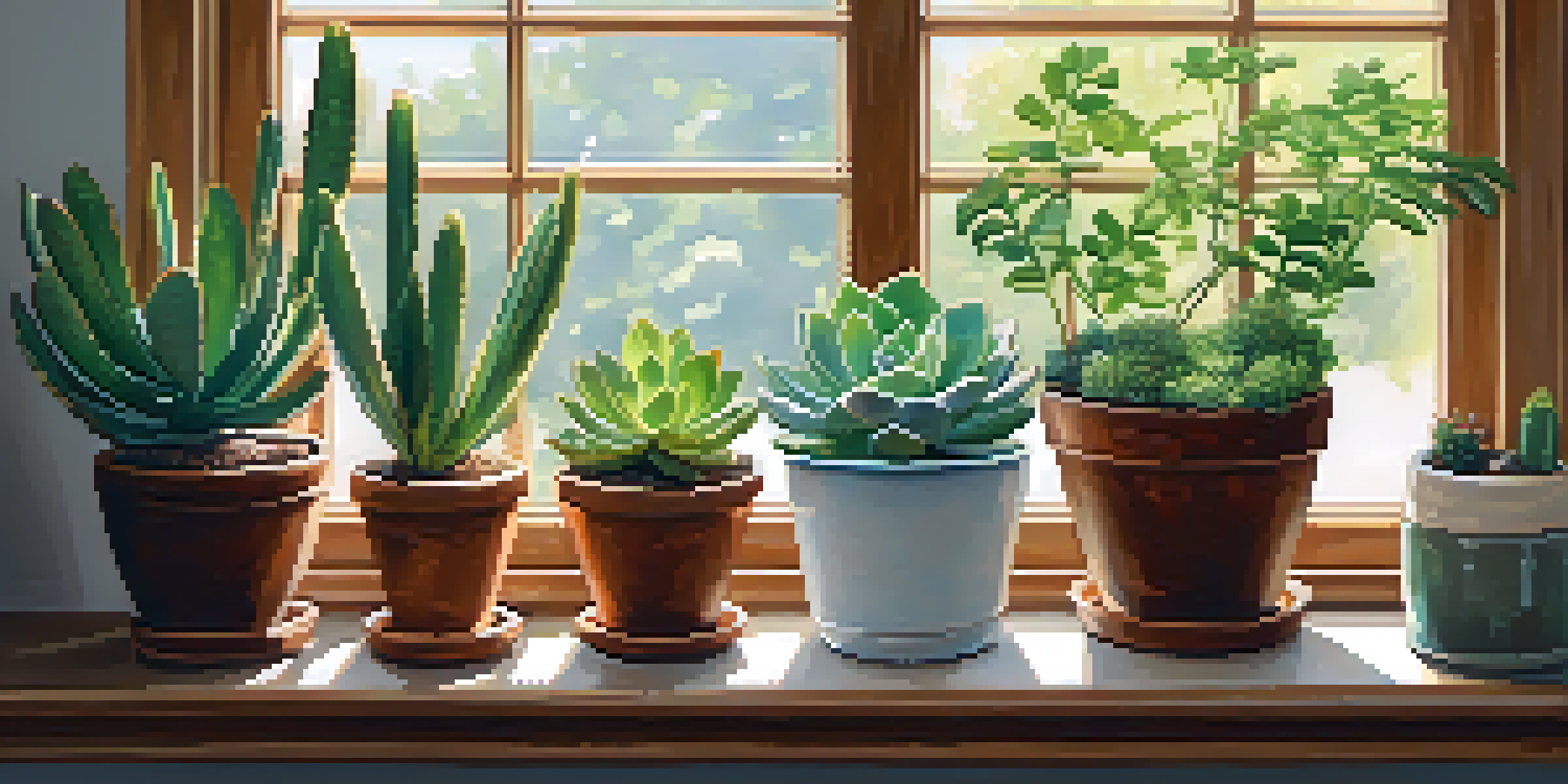The Science Behind Plants and Their Mental Health Benefits

Understanding the Connection Between Plants and Well-Being
The relationship between plants and mental health has gained significant attention in recent years. Studies suggest that exposure to greenery can alleviate feelings of stress and anxiety. This connection stems from both biological and psychological factors that contribute to our overall well-being.
Gardening adds years to your life and life to your years.
When we interact with plants, our bodies respond positively. For instance, being in nature triggers the release of endorphins, which are chemicals that promote feelings of happiness and relaxation. This natural response is akin to the way exercise boosts our mood, showcasing the powerful effect of our environment on mental health.
Moreover, the sight of plants can evoke a sense of calm and serenity. Just as a cozy blanket can provide comfort, a lush green plant can create a soothing atmosphere, reminding us of nature’s beauty and tranquility. By understanding this connection, we can harness plants as tools for enhancing our mental health.
The Role of Nature in Reducing Stress
Nature has a unique ability to lower stress levels, and plants play a crucial role in this process. Research shows that even a brief interaction with greenery can significantly reduce cortisol, the stress hormone. Imagine walking through a park and feeling your worries melt away; that’s the power of nature at work.

One study highlighted that individuals who spent time in natural environments reported lower levels of anxiety and improved mood. Just like a deep breath in fresh air can invigorate you, being around plants allows your mind to reset. It's as if the natural world provides a gentle reminder to slow down and take a breather.
Plants Boost Mental Health
Interacting with plants can alleviate stress and enhance feelings of happiness, promoting overall mental wellness.
Incorporating plants into your daily life, whether at home or work, can create a calming oasis. Picture a small succulent on your desk or a vibrant fern in your living room—these simple additions can serve as a daily dose of tranquility, helping you navigate stressful moments more effectively.
Biophilia: Our Innate Connection to Nature
The concept of biophilia suggests that humans have an inherent affinity for nature. This connection is deeply rooted in our evolutionary history, where natural environments were essential for survival. Today, this primal bond explains why we often seek out green spaces for comfort and rejuvenation.
The best time to plant a tree was twenty years ago. The second best time is now.
Biophilia is not just a theoretical idea; it has practical implications for mental health. When we surround ourselves with plants, we engage that innate connection, fostering a sense of belonging and harmony. It’s similar to how a child finds comfort in a parent’s embrace—nature offers a nurturing presence that can soothe our souls.
Integrating this understanding into our lives can be transformative. By intentionally adding plants to our environments, we invite this natural bond into our daily routines, enhancing our emotional resilience and overall mental well-being.
The Psychological Benefits of Plant Care
Taking care of plants can significantly boost our mental health. Engaging in gardening or simply nurturing a houseplant provides a sense of purpose and accomplishment. It’s like tending to a small project that thrives under your care, giving you a tangible way to experience growth and success.
Moreover, the act of caring for plants can serve as a form of mindfulness practice. When we focus on watering, pruning, or repotting, we momentarily detach from our worries, anchoring ourselves in the present moment. This mindful interaction mimics meditation, reducing anxiety and promoting mental clarity.
Nature Reduces Stress Levels
Exposure to greenery lowers cortisol levels, helping individuals feel more relaxed and rejuvenated.
The joy of watching a plant flourish can also elevate our mood. It's similar to the pride you feel when achieving a personal goal; nurturing a plant fosters a sense of responsibility and joy, reinforcing positive feelings and contributing to a more balanced emotional state.
Plants as Natural Air Purifiers for Better Health
Did you know that many indoor plants can purify the air we breathe? This is particularly important because cleaner air contributes to improved mental clarity and overall health. Plants absorb toxins and release oxygen, creating a more pleasant environment that supports cognitive function.
By reducing indoor pollutants, plants help create a healthier space, which is essential for maintaining mental focus and reducing fatigue. Imagine working in a room filled with fresh air—it's invigorating! This improvement in air quality can lead to enhanced productivity and a more positive mood.
Incorporating air-purifying plants into your home or office can be a simple yet effective strategy for enhancing both physical and mental health. Think of it as creating your little sanctuary, where every breath feels refreshing and uplifting, ultimately supporting your well-being.
The Impact of Colors and Shapes in Plant Aesthetics
The aesthetic qualities of plants, including their colors and shapes, can significantly influence our mood. Bright, vibrant colors like greens and yellows are often associated with feelings of happiness and energy. It’s no surprise that a colorful arrangement can instantly uplift a room and, in turn, our spirits.
Similarly, the shapes of plants can evoke different emotions. Tall, upright plants may inspire feelings of strength and stability, while cascading vines might bring a sense of relaxation and fluidity. Just as a favorite piece of art can resonate with us, the visual appeal of plants can enhance our emotional landscape.
Creating Green Spaces at Home
Establishing a personal green space can provide a nurturing environment that enhances mood and supports mental health.
By thoughtfully choosing plants based on their aesthetic qualities, we can create environments that not only look beautiful but also promote positive feelings. Incorporating these elements into our spaces is like curating a personal gallery of nature that continually inspires joy and tranquility.
Creating Your Own Green Space for Mental Wellness
Establishing a green space in your home can be a rewarding way to boost your mental health. Whether it’s a small windowsill garden or a full-fledged indoor jungle, the act of surrounding yourself with plants can create a nurturing environment. Think of it as crafting your own retreat from the hustle and bustle of daily life.
Start small by choosing a few easy-to-care-for plants, like succulents or snake plants, which can thrive in various conditions. As you cultivate your space, consider how the presence of greenery impacts your mood and productivity. It’s a personal experiment that can reveal just how powerful plants can be.

As you expand your green space, invite friends or family to join in the fun. Gardening can be a shared activity that fosters connection and joy, reminding us that nature not only nurtures us individually but can also enhance our relationships. Together, you can create a vibrant oasis that supports mental wellness for all.